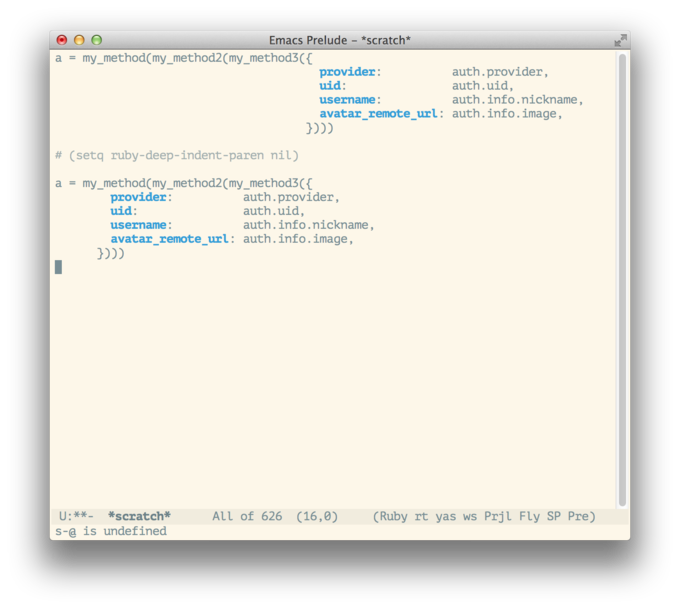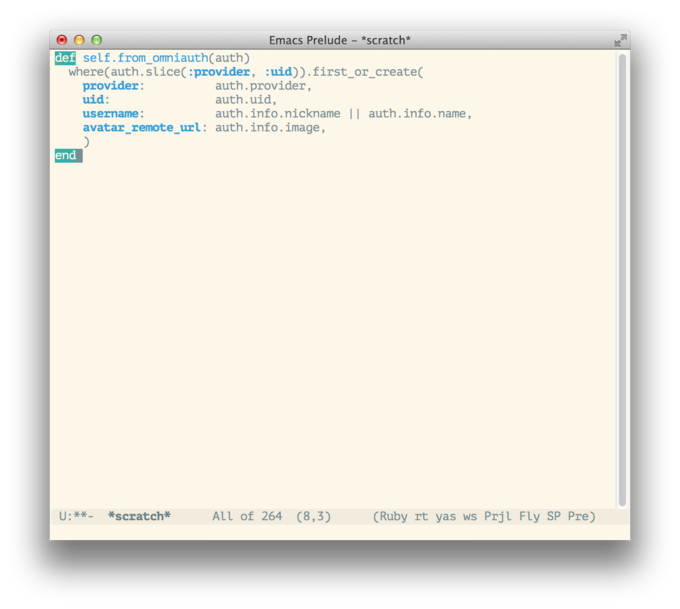-
[北京][2014年9月14日] 中秋后聚会召集 at 2014年09月05日
我也来玩玩。
-
Emacs 函数链接插件配置求分享,求推荐 at 2014年04月05日
robe 或者 ctags:
-
庆祝可以发贴了, Ruby China 的 Emacser 们, 你们在哪里? at 2014年03月20日
#58 楼 @birdfrank 晕,自己改键绑定就是了。可以试试 keychord,定义 jm, jc, jv, jh 分别跳转到 model, controller, view, helper
-
庆祝可以发贴了, Ruby China 的 Emacser 们, 你们在哪里? at 2014年03月13日
"Fashionable editors may come and go, but Emacs forever stands."
Be careful to check out this link, because there is no going back.
-
background-image 图片加载成功但在 Chrome 里不显示,怀疑和 turbolinks 有关? at 2013年12月17日
display: block; position: relative;z-index没设,也没有 overlap 的元素,我部署到 Heroku 上去又能正常显示啦,玄幻。 http://fora.herokuapp.com -
如何翻译 why 先生的这句话? at 2013年12月12日
-
如何翻译 why 先生的这句话? at 2013年12月12日
-
受不了 Emacs 的缩进了,求指点 at 2013年12月12日
#20 楼 @xjz19901211 我按照你的代码结构改了一下,你想要的效果是下面这张图么?

如果是,就不可能没用,你把你的代码打开,在任意一行输入
(setq ruby-deep-indent-paren nil)把鼠标移到这行行尾,然后M-x
eval-last-sexp,再选中代码 tab 或者重新 indent buffer 就好了。或者你直接把这两行代码加到 init.el 或者 .emacs 里面,然后退出重启 Emacs, 再打开这个文件,重新 indent 就好了。
-
受不了 Emacs 的缩进了,求指点 at 2013年12月12日
-
Kernel#` 调用 xclip irb 挂起 at 2013年10月09日
#6 楼 @luikore 我懂你的意思了,再加上 Stackoverflow 上的另一条回答就能够解释为什么
`xclip .bashrc`多花这么多时间了:$ xclip -verbose .bashrc Connected to X server. Using UTF8_STRING. Reading .bashrc... Waiting for selection requests, Control-C to quit问题在于 xclip 不会自己
terminate,要等待selection requests,`xclip .bashrc`之后如果马上用鼠标选点什么东西,他就会马上返回结果。 -
Kernel#` 调用 xclip irb 挂起 at 2013年10月08日
-
Kernel#` 调用 xclip irb 挂起 at 2013年10月08日
不对啊,
xclip为什么会建立管道,只是读取.bashrc的内容到primary selection, 况且这时候摁 Ctrl-d 也没用哦,早上起来换到
root再试了一下,这次xclip .bashrc正常返回了,但是:irb(main):002:0> require 'benchmark' => true irb(main):003:0> puts Benchmark.measure { system "xclip .bashrc" } 0.000000 0.000000 0.000000 ( 0.007043) => nil irb(main):004:0> puts Benchmark.measure { `xclip .bashrc` } 0.000000 0.000000 0.010000 ( 19.856729) => nil -
Minitest assert 和 must 返回的结果不一样,bug? at 2013年09月12日
#2 楼 @doitian 哦,懂了,谢谢啊。 那 Avdi Grimm 在 http://objectsonrails.com/#sec-12_1 这里的测试写错了?
-
Teahour.fm 第 18 期发布 at 2013年06月04日
-
Teahour.fm 第 18 期发布 at 2013年06月04日
#4 楼 @yedingding 把音频加张图片转成视频放 youtube 上去,Closed Captions 然后人工校对下应该会少很多工作量。
-
把字符串写入文件保留'\n' at 2013年05月25日
-
把字符串写入文件保留'\n' at 2013年05月25日
-
把字符串写入文件保留'\n' at 2013年05月25日
#6 楼 @alsotang #7 楼 @luikore Wow, 很完美的解决方法。
str1 = "<ul>\n<li>One</li>\n<li>Two</li>\n</ul>\n" puts str.gsub("\n", "\\n") # => <ul>\n<li>One</li>\n<li>Two</li>\n</ul>\n puts str.inspect # => "<ul>\n<li>One</li>\n<li>Two</li>\n</ul>\n" str2 = "<p><code>\nputs "hello,\\nworld"\n</code></p>\n" puts str.gsub("\n", "\\n") # => <p><code>\nputs "hello,\nworld"\n</code></p>\n puts str.inspect # => "<p><code>\\nputs "hello,\\nworld"\\n</code></p>\\n"我尝试过
str.gsub("\n", "\\n"),对于前一种情况没问题,后面的就出错了。 -
把字符串写入文件保留'\n' at 2013年05月25日
-
把字符串写入文件保留'\n' at 2013年05月25日
-
把字符串写入文件保留'\n' at 2013年05月25日
-
菜鸟练习题,fibonacci 的不同循环结构实现 at 2013年05月07日
def fib(n) Hash.new{ |h,k| h[k] = k < 2 ? k : h[k-1] + h[k-2] }[n] end -
你们 Ubuntu 用什么桌面管理工具? at 2013年04月22日
-
你们 Ubuntu 用什么桌面管理工具? at 2013年04月22日

